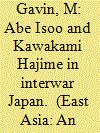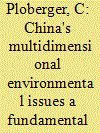|
|
|
Sort Order |
|
|
|
Items / Page
|
|
|
|
|
|
|
| Srl | Item |
| 1 |
ID:
102535


|
|
|
|
|
| Publication |
2011.
|
| Summary/Abstract |
This article explores the views of two eminent professors of economics, Abe Isoo (1865-1949) and Kawakami Hajime (1879-1946), regarding their socialist economic theories for easing poverty in Japan during the interwar years (1918-1939). Prior to this period, Abe believed the cure to capitalism's ills lay in a combination of socialist economic reforms (sangyô demokurashii) and individual spiritual refinement. Kawakami, at that time a bourgeois economist, prioritised the spiritual revolution of the rich over any socialist-type economic reform. Thus, although convinced of the need for a different approach to eradicating poverty, they nevertheless agreed in the need for gradual change rather than radical reform (Gavin East Asia An International Quarterly 24:1, 30). The year 1928 marked a significant turning point both for Japanese social movements and in the lives of Abe and Kawakami. That year heralded Japan's first national election under the new Universal Male Suffrage Law, and saw the police exercise their extended authority as they undertook a nationwide round-up of students and intellectuals suspected of left-wing tendencies (the March 15 Incident). Also in that year, Abe and Kawakami resigned from academic posts to dedicate themselves to alleviating the privations of the working class. Abe, by then well known as the father of Japanese socialism and as a Christian pacifist, became a symbolic figure for Japan's working class parties, although he later came to support the government during WWII. Kawakami, who was forced to resign from his post during the round-up, "washed his hands of bourgeois economics", became a prominent spokesman for Marxism in Japan ([28], xi, pp. 76, 169). This article will reveal that both Abe and Kawakami's social and economic theories changed during the interwar period, so that Abe came to see imperial sovereignty as crucial to socialist economic reform, while Kawakami came to see it as a minion of the capitalists and advocated institutional and political revolution.
|
|
|
|
|
|
|
|
|
|
|
|
|
|
|
|
| 2 |
ID:
102532


|
|
|
|
|
| Publication |
2011.
|
| Summary/Abstract |
China's environmental degeneration carries fundamental political, economic and social implications for its future development and its international reputation. The complexity of the challenge is underlined by the variety of environmental issues China is confronted with. Among them we can identify water shortage, desertification, industrial and urban air pollution, acid rain, and extreme weather patterns. China is already a major polluter and its growth focus as well as the rapid urbanization process we can observe will further increase the pressure on the environment. China's ability or inability of formulating an environmental friendly development strategy is of critical importance for its future development.
|
|
|
|
|
|
|
|
|
|
|
|
|
|
|
|
| 3 |
ID:
013659


|
|
|
|
|
| Publication |
1992.
|
| Description |
187-221
|
|
|
|
|
|
|
|
|
|
|
|
|
|
|
|
| 4 |
ID:
102534


|
|
|
|
|
| Publication |
2011.
|
| Summary/Abstract |
This paper aims to explicate the cultural meaning of sex in the Chinese society of Taiwan with reference to marriage in the Chinese kinship system in Taiwan. Through an examination of how Taiwanese informants talk about sex and their sexual behaviours, we demonstrate that their discourse on sex involves not only the notion of active-male/passive-female but also a symbolic transformation of the 'human-like' woman into an 'animal-like' man. This is arguably the core meaning of sex in Taiwan: sex is a ritual through which women's sexual beings are symbolically transformed from 'human-like' into 'animal-like'. As we shall show, the transformative nature of sex has a significant parallel with the logic of marriage in Chinese kinship system in Taiwan. In other words, there is a significant parallel between marriage in kinship system and sexual discourses in Taiwan. In conclusion, we shall spell out the epistemological implications of this parallel to the studies of Chinese societies: the relevance of kinship studies to the understanding of Chinese societies.
|
|
|
|
|
|
|
|
|
|
|
|
|
|
|
|
|
|
|
|
|